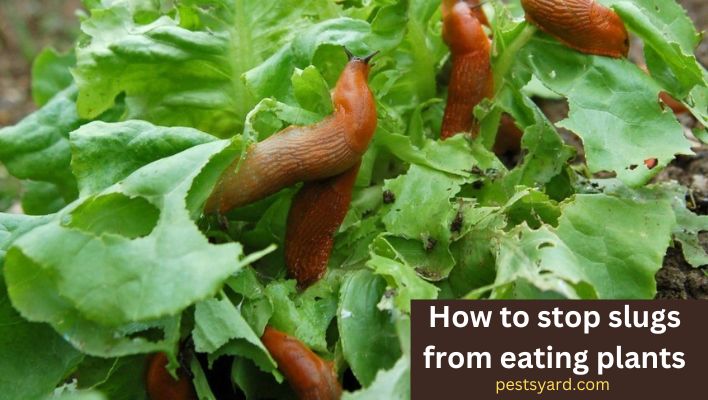Slugs are a common problem throughout the garden. These slimy pests spend their time on your plants, munching and digesting them, leaving behind a slimy trail of destruction. They can be hard to get rid of because they may hide underground or in crevices or in dirts that you don’t notice. So how do you stop these slugs from eating your plants?
There are numerous ways to stop and deter slugs from your plants which are explained below. However, the best method is using Sluggo to kill and deter slugs and snails from destroying your plants. This will also kill their eggs and make your garden free o infestation.
It is no doubt that slugs are destructive when left unchecked, but to entirely get rid of slugs you need to know where they are coming from and why they are attracted to your garden. Knowing this will help you in preventing future infestation.
Below is everything you need to on how to stop slugs from eating your plants in the garden and on pots and prevent future infestation.
Why slugs are attracted to your plants
Slugs are a major pest because they can cause damage to your garden and your plants. They will eat away at the leaves and root systems of your plants, causing them to die.
Slugs are attracted to your plants because they are looking for a place to hide, eat and live. They eat the leaves, stems, and roots of plants and they can do major damage if they are left unchecked. They can eat just about anything that is organic and isn’t poisonous to them, including plants.
Slugs are attracted to your garden and plants because plants are a source of moisture and nutrients. Slugs will crawl up onto your plants and drink the liquid inside.
They love to hide in the moist soil of your garden, but if you can make it too dry, they will not be able to survive and will leave.
But here’s the good news: if you know why and what kind of plant is attracting slugs and snails, you can use this knowledge to keep them away from your favorite plants.
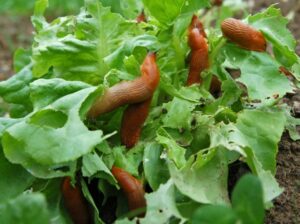
How to stop slugs from eating plants naturally
Slugs and snails are one of the most common garden pests. They can be a nuisance, but they can also be very damaging to your plants if not taken care of early. There are various methods to get rid of slugs and it is advisable to try numerous and stick with one that is convenient to you.
Slugs and snails can eat over 80% of the flowers and plants in your garden. They do this by eating the leaves, stems, buds, and fruit of your plants. If you have a slug problem in your garden, you may have noticed that the damage is more severe than usual.
Slugs damage is not only visual, but they can also cause structural damage to your plants. Slugs may even eat through the bark of trees. If you notice any of these signs of slug activity or damage to your plants, it’s time to take action:
Use Sluggo
Sluggo is not just for slugs! It’s also effective against snails and earwigs as well as many other pests that like to eat your garden plants. It is a great way to stop slugs from eating your plants. It’s safe for kids and pets, too. It’s made from organic ingredients that kill slugs on contact, and it is available at most garden centers and home improvement stores.
- Apply Sluggo as a foliar spray (either directly onto the leaf or foliar-applied) at the rate of 1 oz per gallon of water. This amount will kill up to 99% of slugs on contact.
- Treat your soil with Sluggo once every 2 weeks for the best results. Try mixing 2 oz per gallon of water into your potting soil and then apply it once every week until you see an improvement in your slug population
Handpick slugs
Handpicking slugs from your garden can be a pain, but it’s the best way to deal with them. We recommend picking them up and putting them in a container of salt or vinegar solution, which will kill them instantly.
You can pick slugs up with a twig or stick. Then place the slugs in a jar filled with salt water (1/4 cup salt per gallon of water) or vinegar solution (2 tablespoons vinegar per quart of water). Repeat this process to reduce the slug population in your garden.
However, this can time consuming, especially if you have a large garden as it involves checking your plants for these pests. Also, this method will not repel slugs from your garden.
Copper tape
Another option is to use copper tape on top of your garden beds to kill slugs before they get to your plants. Copper tapes are not only effective but also inexpensive, just wrap it around each stem as far up, or around the rim of the pot to keep slugs and snails away from your plants.
Use egg shells
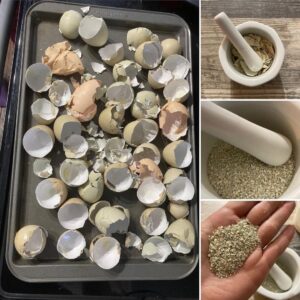
Slugs are very sensitive to the sulfides in eggshells and will avoid them completely. The sulfur dioxide contained in eggshells also has a repellent effect on slugs, so it’s a great preventative measure as well. The eggshells will also act as a natural fertilizer for your garden, so you’ll be getting both protection and a little extra goodness for your plants.
It’s simple: crush up eggshells and sprinkle them around the plants. Slugs are scared of the smell of eggs, so they won’t go near your plants. You can also add crushed eggshells to your compost pile or spread them along the bottom of your garden bed to deter slugs.
Use salt
Salt is harmful to slugs and will kill them once it comes into contact with their bodies. You can sprinkle salt around your plants or add a little bit of salt to existing slug holes in the soil. To make sure that it works, give it a few days before trying again if you feel like it hasn’t worked.
Salt is a natural plant fertilizer when used properly, so if you sprinkle it on the leaves of your plants, they’ll start to grow faster and healthier. You can also use salt as a preventative measure, sprinkle it around the perimeter of your garden before you plant, and you’ll be able to protect your plants from hungry slugs for good.
You can also mix salt with water, mix one pound of table salt with two gallons of water in a large bucket or tub and soak your plants until they are thoroughly saturated with the solution.
Use beer traps
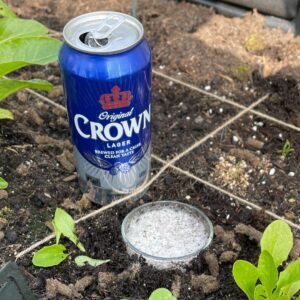
There are several methods you can use, but one of the most effective is to use beer traps. The beer traps work by attracting the slugs and making them drunk on alcohol. Once they’re drunk on alcohol, they drown in their stomach juices and die.
You can make a beer trap using any kind of beer, with a plastic bottle or bowl. Here is how to make a good beer trap to keep your plant safe.
You can use this method in different ways around your garden where you have plants that need protection from being eaten by slugs. You can also use it around areas where no plants are growing so that there won’t be any risk involved when using this method.
Use Garlic Spray
Garlic has been used in natural remedies for centuries, and its reputed ability to repel slugs and snails is no joke. The smell of garlic is known to repel slugs and snails. Just mix a few cloves of garlic with about 1 cup of water, then pour this mixture over your plants’ leaves or stems.
You can also put the mixture into a spray bottle and apply it directly onto the leaves of your plants. You’ll want to reapply this treatment every few days until you notice an improvement in slug-freeness.
This will help prevent the slugs from eating the leaves of your plants and will also repel them away from your plant altogether.
Attracts Predators
Many different animals enjoy eating slugs including spiders, birds, and even cats. You can encourage these predators by planting flowers near your garden so they will have a place to hang out.
Toads are also good for slugs because they eat all sorts of things, including snails and worms. If you want to keep slugs away from your vegetable garden, be sure to provide a home for at least one toad in your garden.
If you have plenty of birdhouses or other places where birds can nest, you may find that your garden is free of slugs once they realize that they’re not welcome there.
Try coffee grounds
If you’re looking for a natural way to keep slugs away from your plants, try using coffee grounds. The astringent properties of coffee beans will deter slugs from crawling on your plants and eating them. You can also use the grounds to help control other pests like aphids and whiteflies.
Slugs hate coffee grounds because of caffeine and other chemicals in them. Coffee grounds will prevent slugs from eating the parts of your plant that are most important, like roots and stems.
It’s best if you sprinkle the grounds on top of the soil, but if you don’t have any handy, try sprinkling them onto the sides of pots or directly onto leaves so they have an easy time getting in there without being too far away from where they need to be.
Use diatomaceous earth
Diatomaceous earth is made up of tiny fossilized remains of microscopic algae, called diatoms, which were once part of plankton in the sea. The chalk-like substance was first used as a weight-loss aid and then as a deodorant to keep houseflies away from food. Now it’s often used for gardening as a way to control pests.
You can use diatomaceous earth by sprinkling it around the plants where you see them eating the leaves or stems. It works by “chiseling” into the exoskeleton of slugs and snails and killing them by dehydration, slowly over time.
It can take multiple applications for diatomaceous earth to be effective, and many gardeners swear by its ability to protect their plants from hungry slugs and snails. When applied to the soil, diatomaceous earth doesn’t harm plants or animals and it helps them grow healthier roots.
Use companion planting
Companion planting is a great way to keep your plants safe from slugs and snails. The idea is simple: plant around your plants as a barrier so that the slug can’t get to them. You can do this by planting carrots, radishes, basil, marigold, and other plants that can be eaten by slugs around your garden. Slugs don’t like the taste of these types of plants and won’t go near them.
Use slug pallets
Slug pallets are a great way to help get rid of slugs without using chemicals or pesticides. Slugs love to eat the roots of plants, so you can use slug pallets in place of regular mulch to protect your garden beds from their pesky pests.
Slug pallets are made from natural materials like wood and straw and are sold online or at garden centers around the country. They’re easy to use and come in different sizes, so you can find one that works best for your garden. Speinkle those pallets around your plants, this slugs will eat them and die. There are pallets lace to deter slugs from your garden.
Use Bran
Bran is the outer coating of grain that comes off when you grind up wheat or other grains. It’s not pleasant to eat, but it’s great for killing slugs because it contains a combination of natural toxins that are lethal to slugs.
Bran is made up of tiny little particles that are very rough on slugs’ skin, so it’s great for repelling them. It’s also available in many different forms, you can buy it as an organic feed or as a natural fertilizer.
Vinegar slug control
Vinegar is a great way to keep slugs and snails away from your plants. You can make a solution by mixing one part of vinegar with two parts of water (1:2). This can be applied to the plant’s leaves and stems using a spray bottle or watering can.
However, you have to be careful as this solution can damage plants, use only once in two weeks. The vinegar will kill the slugs on contact, so you’ll need to reapply it every few days to continue controlling them.
Peppermint oil
While there are many ways to kill slugs, one of the most effective methods to repel slugs is peppermint spray. This oil can spray directly on their bodies or around the garden. The oil will create an environment that is not conducive for them.
To use this method, simply mix 1 part peppermint oil with 2 parts water and pour it over your plants. The best time to spray your plants is in the morning when you take care of them after watering them. This way, you’ll be sure to get all of the slug droppings off of your plant before they can damage it further.
If you notice any slugs coming into contact with your plants while they’re still alive, they can also be killed immediately with peppermint spray sprinkling salt on them.
How to stop slugs eating plants in pots
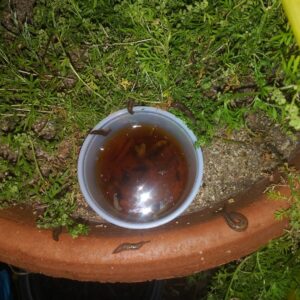
Slugs will need to crawl over your pot to have access to your plants; you can stop this through various methods to keep your plants safe. Some of these methods have been listed above as some of the natural ways to get rid of slugs from your plants.
-
Raise your pots
Raise your pots. Slugs and snails are attracted to the moisture that comes from the soil, so you can try raising your pots above the ground by at least 3 inches, making it hard for slugs to climb.
-
Copper tape
Copper tape is a great way to keep slugs out of root systems, but it’s also an effective way to kill slugs. Just wrap the copper tape around the edge and base of the pot (and any other areas where slugs might be hiding), then place some coffee grounds around the edges so that they can’t escape through the holes in the tape—and voila! You’ve got yourself a tasty meal for those pesky little critters.
-
Use slug traps
There are lots of different kinds of traps for slugs—some are baited with beer or fruit, while others are just plain old stink bombs that get left out in the garden during the day (but not overnight). Some people like to use hanging baskets as bait boxes because they’re easier to find than regular garden pots with holes in them, but I usually just use these kinds of traps when I have friends over who like gardening as much as I do!
-
Use slug pallets
Slug pellets are a safe and effective way to get rid of slugs in your garden without harming the environment. The pellets are made of potassium salts and will attract slugs that come near them so they can be disposed of later. They’re also biodegradable, so they won’t harm the soil or water surrounding your plants. Sprinkle these pallets around the plants to kill slugs and snails trying to eat your plants
-
Use diatomaceous earth (DE)
This works by dehydrating their shells so they cannot survive outside of water. It also absorbs moisture from the soil around it which will kill off any other living organisms within a certain radius around it. DE is available at most hardware stores or online retailers such as Amazon or Home Depot.
-
Use egg shells
Sprinkle egg shells around the base of your plants to deter slugs and snails from eating them. Like many animals, these slimy critters hate crawling over sharp edges. The shells will make it harder for them to eat up your plants’ roots.
-
Introduce Nematodes
Nematodes are microscopic organisms that naturally occur in soil. They’re best known for helping control plant diseases, but they also help keep slugs at bay.
They’re easy to find at a garden center and can be purchased online or at any local nursery. The best time to introduce nematodes is during the spring, though they can be used year-round. Once the nematodes are in your soil, they will be happy to hunt down any slugs in your garden.
-
Use sawdust
Spread sawdust around the base of your plant pots so that the slugs can’t get access to the roots of your plants. This will keep them from eating all of your plants, and will also make them uncomfortable enough that they’ll move elsewhere; which means you won’t have to worry about them anymore!
-
vaseline to stop slugs
Vaseline is great for repelling slugs and other pests, so make sure you buy the right kind! You want something thick enough to stick out from under your plants and not just spread throughout your soil. You can use it anywhere in your garden, or you can put it on the plants themselves.
Next, place some Vaseline under each plant where it will be most exposed; this includes around their stems as well as underneath their leaves. You can also use some alongside any other pesticides or sprays you may have purchased; this will help keep them effective longer than they would otherwise be able to last against such a pest problem.
Applying vaseline around the plants will make it difficult for slugs to cross over them, thus protecting your plants. So applying it around their vulnerable areas can deter them from attacking plants.
Can plants recover from slug damage?
Slug damage can be a bit of a pain, but most times it’s not the end of your plants. If you curb slug infestation early enough, you can treat it and your plant will be back on its feet in no time.
When you think about it, though, plants are pretty resilient. They have mechanisms in place to handle stress and injury, including cellular repair and a built-in ability to bounce back from death.
If you notice slugs on your plants, don’t panic; Slug feeding can affect plants in many ways. In some cases, they’ll grow back after a few weeks or months; in others, they’ll suffer permanent damage that will take much longer to heal especially if the plant is young.
It’s important to note that not all types of plants are vulnerable to slug damage—some are more resistant than others. If you know what type of plant is vulnerable to slug attacks, you can take steps to protect it from slugs so that it has a better chance of recovery. For example:
- If possible, try not to grow plants close together or near each other on the same row. Instead, choose a spot where each one can stand on its own without being crowded by other plants.
- Plants with thick leaves or bark may be less vulnerable because these features help them resist physical injury from slugs
- If your garden already has lots of slug damage and you don’t want more slugs, ensure you get rid of every and prevent future infestation
After removing the slug and its eggs (if necessary), use a quality fertilizer that has been specially formulated for your plants’ needs and apply it to the affected areas of your plant’s roots. If you have trouble discerning what kind of fertilizer is best for your plants, consider their health when choosing one, your soil pH level, amount of organic matter in your soil, and nutrient content are all factors that play into how much fertilizer is needed on any given day.
How to prevent slogs from eating your plants
One thing you can do to prevent slugs from eating your plants is to make sure they’re not around. Slugs are active at night, so if you can keep them out of your garden during that time, they won’t be able to eat your plants.
Another thing you can do is kill the slugs that are already in your garden. You can do this by using a pesticide or spray bottle with water and soap. Make sure that you don’t get any of it on your leaves or stems because it will damage them. Use slug pellets or granules around the edges of your garden to keep them from entering.
Keep your garden clean; if dead leaves or other debris are lying around, slugs will come out and eat it. It may seem like a small thing, but it will help keep your garden healthy and free from pests like slugs.
